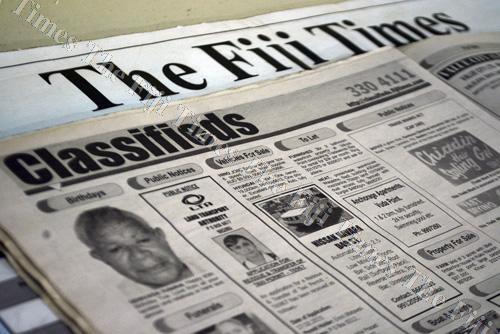
Atasa Moceituba
SUVA (The Fiji Times/Pacific Media Watch): Fiji's Citizens Constitutional Forum says amendments made to the Media Decree will not bring about any significant change to the restrictive media environment in the country.
CCF programme manager Ken Cokanasiga said the threat and fear of fines might have been removed from journalists but it remained for the publishers, editors and organisations that employed them.
As such, he said, the media industry remained censored.
"Lifting the fines on journalists is encouraging and a positive development, but this does not solve the over-arching problem of media censorship in Fiji," Cokanasiga said.
He said the media played a vital role in building a vibrant democracy and it was imperative that the media organisations were free to carry out their work without censorship or intimidation from executive authorities.
With the proposed amendment, Cokanasiga said, journalists were spared a fine not exceeding $1000 FJD ($471 USD).
However, media organisations and editors, publishers, and corporate bodies were still liable to heavy monetary fines or imprisonment terms, or both.
"This will result in media organisations continuing to employ self-censorship practices as they have been since the Media Industry Development Decree was introduced in 2010."
Radio New Zealand International reported that the president of the Fijian Media Association, Ricardo Morris, said this was a step forward, as it meant ordinary journalists did not have the prospect of a fine hanging over their head.
But the FMA was concerned that fines for editors and publishers still existed.
The editor-in-chief of The Fiji Times, Fred Wesley, said he hoped the amendment would allow journalists to do their work without fear.
In a separate media freedom issue, Fiji Times columnist and academic Professor Wadan Narsey has criticised the government for blocking state advertising from the Times, saying that preventing readers to access this essential public service was a "gross denial of their human rights'.
During a parliamentary debate, it was admitted by the Fiji government that in recent years the state had made a decision to place all its advertisements in the Fiji Sun, and discourage any in The Fiji Times.
"As a rough guess, this annually directs more than $5 million more to the Fiji Sun, even taking into account the few advertisements placed with The Fiji Times in the last few weeks," Dr Narsey wrote.
"The facts about the newspaper media are that The Fiji Times and the Fiji Sun are both privately owned. The Fiji Times has as high a circulation if not more, than the Fiji Sun. Most readers, and especially the poorer people, cannot and do not buy both newspapers."
This work is licensed under a Creative Commons Attribution-NonCommercial 3.0 New Zealand Licence.




